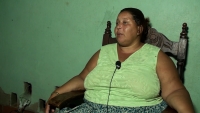Yusmagli González Luque
* 1978
-
“I want to have buy food for reasonable prices. Because I am poor, I do not have a family outside the country sending me to Cuba some money. Do you understand me? Always when I visit some store, I see that everything is expensive. And since I am poor, I cannot buy anything. Because the little money I have, is just for survive. And I think that what they should do is to decrease the prices, so that the rich and the poor, whoever, can eat, can buy staff. ‘Whose fault is it?’ Our president is the culprit, our state, because us, people are not the culprits. If the president says: ‘No, now we are going to decrease the prices, for the poor people, so that everyone can buy for a reasonable price.’ If he does not increase the salary, or if he does not provide us food, we are lost.”
-
“Yes, they are punished and persecuted [street sellers in Cuba]. The State Security takes away their merchandise, beats them, runs over them, gives them extremely high fines which they cannot pay, for benefiting the population. Just because the state stores do not have anything to offer. There is no butcher shop that can offer some meat, you can check that yourself. Particular sellers are those who buy and sell you a piece of meat, so you can eat. However, the state police observe them, they are close to them, they confiscate everything, beat the sellers up, or condemn them to the prison. And for me this means torture. If you cannot provide to your people resources, and someone could and people are looking for these resources, but you treat the providers as our Government does, it is called torture.”
-
“My cousin Agustín Palma Masa, a former political prisoner, could not solve his job situation. And I really do not know if it happens because he is a former prisoner, but they have not offered him any job. Nobody proclaimed the faith. He was obliged to pay a special fee, exaggerated sum of money, to be able to be employed by someone. It must be exceedingly difficult for his family he has a family to support. Do you understand me? I think that it is really cruel, when you are a political prisoner and you want to rejoin the society, they should give you a job immediately, so that he can support his family. Agustín was obliged to work illegally during some time, until he gained some money, to be able to find a stable regular job. He had to pay for his job position, and many bribes. Do you get it? Just because he wanted to get some job.”
-
“In the Detention Detachment in Havana we were given food only once a day. I was detained by the State Security, they brought me to the detention, and charged me a fine of 200 pesos. After this action I thought I would be going back home to Guantanamo, I did not think I would be imprisoned. I remember a day, on February 14, when they told me: ‘No, you don’t have to stay anymore in the dungeons. We will move you to the regular jail.’ I was really surprised, I said: ‘What do you mean to a regular jail if I did not commit any crime?’ ‘We have to wait for the Chief of the Department to come and issue special permission so you could leave.’ My mind blew up, I declared a hunger strike, I was not going to eat, there in a Detention Detachment Park 24. And I insisted on my innocence, I did not committed any crime, I would not wait until Monday for the Chief of the Department to let me go home, because I did not committed any crime. I wallowed that I was not going to eat any more. Until they brought me to the chief of the shift, to whom I proclaimed again that, I was not going to wait there until Monday.”
-
Full recordings
-
Cuba, 24.05.2020
(audio)
duration: 01:12:49
Full recordings are available only for logged users.
“Cuba will not change. It will continue the same here. We will always be poor.”
Yusmagli González Luque, born in 1978 in Guantánamo, Cuba. She has lived her entire life in a poor and violent neighborhood called the “South” in Guantanamo. When she became pregnant in 1994, she had to end her educational process prematurely and never had the opportunity to continue. As an under-aged mother, she faced serious financial problems without any support from the Cuban Government. She tried to resolve her financial problems by traveling to Havana to directly request some form of financial assistance from the governmental authorities. Instead of helping her, the authorities detained her in jail for a month and then deported back to Guantanamo. Not even her osteochondritis disease has mediated as a sufficient reason to obtain social aid. With the expectation of solving her situation, she joined the opposition movement, “Ladies in White” [Las Damas de Blanco]. However, she had to leave this organization to provide constant care to her ill father. She lives with her daughter, Natalia, her son-in-law, and her cousin, Agustín Palma Masa, who are being persecuted by the regime for their oppositional activities.
